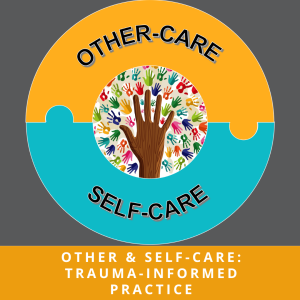Other and Self-Care Trauma Informed Practice
 About this Training:
About this Training:
Trauma is an experience so intense that our capacity to cope becomes overwhelmed. This is a common theme among people experiencing homelessness – trauma contributes to homelessness, while homelessness is often traumatizing. Recent research has given us a clearer insight into how trauma is created, and the most effective ways to build resilience with those who are navigating trauma as well as those supporting and interacting with people who have experienced trauma, which can often create challenges for individuals in support roles to effectively cope, which is sometimes referred to as vicarious trauma.
Trauma-informed care helps people be person-centred in their work and understand that the individual is not to blame for their situation. TIC Incorporates practices and beliefs, individually and organizationally, that ensure participants are treated in a manner that helps restore their trust and sense of safety. Trauma-Informed Care is an evidence-based practice that focuses on promoting a culture of safety, empowerment, and healing. It begins by recognizing that true
| Instructor Led (In-person and virtual options) |
|
Training Audience: This training is appropriate for:
Note – The TTA requests that all training include at a minimum, one member of leadership from each organization/agency represented, be present as a learner. |
|
Training Length: In-Person: 2 full day days (16 hrs) |
|
Training Capacity: In-Person: 40 maximum / 8 Minimum |
|
Training Objectives: Attendees will:
|
|
Training Features: In-Person:
Virtual:
Both:
|
|
Training Prerequisite Onboarding Modules Mandatory: None |
|
Certificate of Completion Through the TTA LMS, attendees will have the ability to receive a certificate of completion of the training by:
Once the assessment is passed, a link will appear allowing the certificate to be downloaded. |
|
Training Costs: Please inquire using the “Request More Info” button to the right regarding fee. Please note that all fees quoted should be considered an “all-inclusive” cost which means there would be not additionl costs for travel, prep, admin, or other items added to the rate provided to you with the exception of provincial tax. Members: A system, community, or organization can become a “Member” by purchasing an annual subscription to self-paced online onboarding modules. Discounts on live training are available determined by the subscription package chosen. (See “Onboarding Module” section here). |
Trauma-Informed Care cannot exist without practicing intentional Self-Care.
Care for ourselves is a critical component of providing effective care to others. Self-care is a discipline that staff working with people with complex needs can and must utilize to ensure ongoing health and wellness in and out of their working environment and be able to address the potential impacts of vicarious trauma. This can often result in “burnout” which can leave people feeling powerless, unmotivated, and defeated. This training explores specific strategies and concepts related to both quality self-care, including addressing and mitigating burnout and effective trauma-informed work. It will also provide direction and understanding for how self-care and trauma-informed care intersects and will leave participants with an understanding of the importance of practices that respect the dignity of the individual while honouring the health and well-being of the worker.
This workshop will explore the science behind trauma, including Vicarious Trauma, exploring the ways trauma impacts the brain, indicative behaviours of trauma that might present, and specific non-clinical, easy-to-use tools and practices that frontline staff may use in their work in the field.
In addition, learners will explore different types of traumas (burnout included), complete self-assessments, and take a critical/constructive view of their own workplaces and processes with an eye to applying these learnings in their own practices.
Team Leads/Managers and Community Leaders can benefit from this workshop as a means to kickstart conversations about practice, process, or systems change with their teams.
Important Note: We make every effort to model and practice trauma-informed care during the workshop. Nevertheless, it is important to know that to facilitate effective learning, there will be frank discussion of trauma and its impacts. We understand that these conversations can be triggering for some people.
